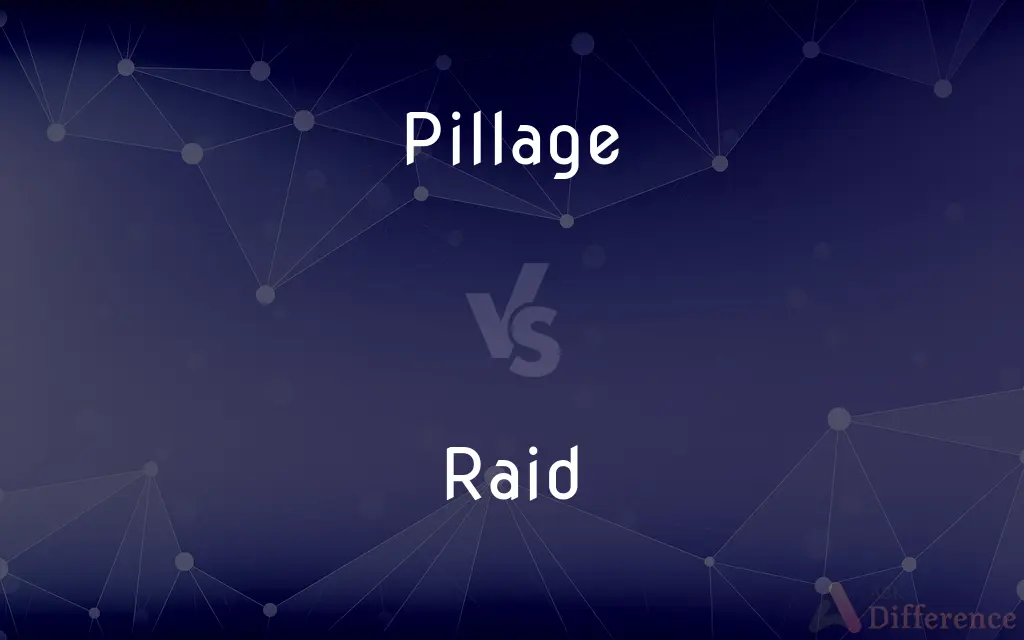Pillage vs. Raid — What's the Difference?
By Tayyaba Rehman & Fiza Rafique — Updated on March 27, 2024
Pillage involves looting and destruction, often in wartime, while a raid is a sudden attack for theft or destruction.

Difference Between Pillage and Raid
Table of Contents
ADVERTISEMENT
Key Differences
Pillage refers specifically to the act of looting or plundering, usually in a context of war or conflict, where one party forcibly takes goods from another, often accompanied by violence and destruction. Raid, however, encompasses a broader range of sudden attacks or incursions, not solely for plunder but also for military, strategic, or punitive purposes. While pillaging is almost exclusively associated with theft and destruction, raids can be conducted with the intent to gather intelligence, destroy strategic assets, or capture individuals without necessarily involving theft.
The concept of pillage has been historically associated with the aftermath of battles or sieges, where the victors loot the defeated party's possessions as a form of spoils of war. Raids, on the other hand, are often premeditated attacks aimed at specific targets for quick strikes, sometimes as a precursor to larger military actions. Pillage is driven by the motive to acquire wealth or resources by plundering, whereas raids might be motivated by a variety of strategic objectives, including weakening the enemy, creating chaos, or retaliation.
Pillage is typically characterized by widespread looting and destruction, often resulting in significant harm to civilian populations and properties. Raids are usually more targeted, focusing on specific locations or objectives and are often of shorter duration. The term "pillage" evokes images of marauding and ransacking through an area, while "raid" suggests a swift, focused attack or incursion.
Legally and ethically, pillage is condemned under international law, especially in relation to armed conflicts, highlighting its association with war crimes. Raids, depending on their nature and execution, might not necessarily be deemed illegal or unethical, especially if conducted within the bounds of warfare law and without targeting civilians.
While both pillage and raid imply aggressive actions, the former is more often used in historical or wartime contexts, emphasizing the aspect of looting and unnecessary destruction. Raids, conversely, are common in both military operations and criminal activities, signifying a wide range of actions from strategic military strikes to police operations against criminal elements.
ADVERTISEMENT
Comparison Chart
Definition
Looting and destruction, often in wartime.
Sudden attack for theft, destruction, or strategic purposes.
Context
Historically associated with war and conflict aftermath.
Can occur in both military and criminal contexts.
Motive
Primarily to acquire wealth or resources by plundering.
Varied, including strategic, punitive, or theft objectives.
Characteristics
Widespread looting, significant harm to civilians.
Targeted, focusing on specific objectives, shorter duration.
Legal/Ethical Status
Condemned under international law, associated with war crimes.
Varies; can be lawful in military operations or criminal.
Compare with Definitions
Pillage
Destruction accompanying theft.
Villages were left in ruin after the pillage.
Raid
Quick theft or destruction.
Bandits carried out a raid on the village.
Pillage
Illegal under international law.
Commanders may be held responsible for allowing the pillage.
Raid
Police operation.
A raid on the warehouse uncovered stolen goods.
Pillage
War-time looting.
The invading army was notorious for its pillage of conquered towns.
Raid
Strategic incursion.
The raid was aimed at disrupting the enemy's supply lines.
Pillage
Associated with historical conquests.
The pillage of ancient cities often left them in ashes.
Raid
Varied motives.
The raid on the compound was to gather intelligence on enemy plans.
Pillage
Plundering for goods.
Historically, pirates engaged in the pillage of merchant ships.
Raid
Sudden military attack.
The special forces conducted a night raid to capture the fugitive.
Pillage
To rob of goods by force, especially in time of war; plunder.
Raid
A surprise attack by a small armed force.
Pillage
To take as spoils.
Raid
A sudden forcible entry into a place by police
A raid on a gambling den.
Pillage
To take spoils by force.
Raid
An entrance into another's territory for the purpose of seizing goods or valuables.
Pillage
The act of pillaging.
Raid
A predatory operation mounted against a competitor, especially an attempt to lure away the personnel or membership of a competing organization.
Pillage
Something pillaged; spoils.
Raid
An attempt to seize control of a company, as by acquiring a majority of its stock.
Pillage
(ambitransitive) To loot or plunder by force, especially in time of war.
Raid
An attempt by speculators to drive stock prices down by coordinated selling.
Pillage
The spoils of war.
Raid
To make a raid on.
Pillage
The act of pillaging.
Raid
To conduct a raid or participate in one.
Pillage
The act of pillaging; robbery.
Raid
(military) A quick hostile or predatory incursion or invasion in a battle.
Pillage
That which is taken from another or others by open force, particularly and chiefly from enemies in war; plunder; spoil; booty.
Which pillage they with merry march bring home.
Raid
An attack or invasion for the purpose of making arrests, seizing property, or plundering.
A police raid of a narcotics factory
A raid of contractors on the public treasury
Pillage
To strip of money or goods by open violence; to plunder; to spoil; to lay waste; as, to pillage the camp of an enemy.
Mummius . . . took, pillaged, and burnt their city.
Raid
(sports) An attacking movement.
Pillage
To take spoil; to plunder; to ravage.
They were suffered to pillage wherever they went.
Raid
(Internet) An activity initiated at or towards the end of a live broadcast by the broadcaster that sends its viewers to a different broadcast, primarily intended to boost the viewership of the receiving broadcaster. This is frequently accompanied by a message in the form of a hashtag that is posted in the broadcast's chat by the viewers.
Pillage
Goods or money obtained illegally
Raid
(online gaming) A large group in a massively multiplayer online game, consisting of multiple parties who team up to defeat a powerful enemy.
Pillage
The act of stealing valuable things from a place;
The plundering of the Parthenon
His plundering of the great authors
Raid
(transitive) To engage in a raid against.
The police raided the gambling den.
The soldiers raided the village and burned it down.
A group of mobsters raided an art museum and stole a bunch of paintings.
Pillage
Steal goods; take as spoils;
During the earthquake people looted the stores that were deserted by their owners
Raid
(transitive) To lure from another; to entice away from.
Raid
(transitive) To indulge oneself by taking from.
I raided the fridge for snacks.
Raid
A hostile or predatory incursion; an inroad or incursion of mounted men; a sudden and rapid invasion by a cavalry force; a foray.
Marauding chief! his sole delightThe moonlight raid, the morning fight.
There are permanent conquests, temporary occupations, and occasional raids.
Raid
An attack or invasion for the purpose of making arrests, seizing property, or plundering; as, a raid of the police upon a gambling house; a raid of contractors on the public treasury.
Raid
To make a raid upon or into; as, two regiments raided the border counties.
Raid
A sudden short attack
Raid
An attempt by speculators to defraud investors
Raid
Search without warning, make a sudden surprise attack on;
The police raided the crack house
Raid
Enter someone else's territory and take spoils;
The pirates raided the coastal villages regularly
Raid
Take over (a company) by buying a controlling interest of its stock;
T. Boone Pickens raided many large companies
Raid
Search for something needed or desired;
Our babysitter raided our refrigerator
Common Curiosities
Why do armies pillage?
Historically, armies pillaged to obtain resources, wealth, or as a form of punishment against their enemies.
Can a raid be legal?
Yes, raids can be legal, especially when conducted by law enforcement or military operations under lawful orders.
How does international law view pillage?
Pillage is explicitly prohibited under international law, particularly in the context of armed conflict, and is considered a war crime.
What's the main difference between pillage and raid?
Pillage focuses on looting and destruction, often in wartime, while raids have broader motives including strategic strikes or theft.
Can pillage have political motives?
Yes, pillage can be used as a political tool to weaken or punish a populace or government.
What prevents pillage in modern warfare?
International laws, conventions, and the potential for war crime charges act as deterrents against pillage.
How do communities recover from pillage?
Recovery can be slow, requiring aid, reconstruction efforts, and healing from psychological trauma.
What are the consequences of pillage?
Pillage can lead to significant cultural, economic, and humanitarian damage, often leaving populations in poverty and distress.
What role does technology play in raids?
Technology enhances the efficiency and effectiveness of raids, from surveillance to precision targeting.
Can civilians conduct raids?
While typically associated with military or police actions, raids can also refer to sudden attacks by civilians, often in the context of looting or vigilantism.
Is pillaging a common practice today?
While less common, pillage still occurs, especially in areas of conflict, and is universally condemned.
Do raids target civilians?
Military and police raids usually aim to minimize civilian harm, focusing on specific targets, though civilian raids for looting do occur.
How are raid strategies developed?
Raid strategies are carefully planned to achieve specific objectives, often requiring intelligence gathering and precise execution.
How are raids coordinated?
Raids require coordination and secrecy, often involving specialized units and detailed planning.
What historical examples illustrate the difference between pillage and raid?
The Viking raids on Europe were targeted, often for plunder, while the pillage of cities in ancient wars involved extensive looting and destruction.
Share Your Discovery

Previous Comparison
Mucoid vs. Mucopurulent
Next Comparison
Sick vs. IllAuthor Spotlight
Written by
Tayyaba RehmanTayyaba Rehman is a distinguished writer, currently serving as a primary contributor to askdifference.com. As a researcher in semantics and etymology, Tayyaba's passion for the complexity of languages and their distinctions has found a perfect home on the platform. Tayyaba delves into the intricacies of language, distinguishing between commonly confused words and phrases, thereby providing clarity for readers worldwide.
Co-written by
Fiza RafiqueFiza Rafique is a skilled content writer at AskDifference.com, where she meticulously refines and enhances written pieces. Drawing from her vast editorial expertise, Fiza ensures clarity, accuracy, and precision in every article. Passionate about language, she continually seeks to elevate the quality of content for readers worldwide.














































